Report and photos by Rick Carey, Auction Editor

2014 was the year Bonhams sold Ferrari 250 GTO s/n 3851GT for $38,115,000, an all-time record for a collector car – or any car at all for that matter – at auction.
Some pundits thought the GTO, the first time one has been offered publicly since Brooks Auctioneers offered s/n 4293GT, second overall at Le Mans in 1963, at Gstaad in 2000 with an unsuccessful high bid of $7.7 million, could catapult into the ionosphere at $45, or $50 million or more. It was not to be.
Auctioneer Robert Brooks wheedled the bidders in a crowded marquee on Thursday afternoon, ultimately coaxing out $50K bid increments until all but a phone bidder were exhausted. 3851GT is said to be going to an avid contestant in historic events – its highest and best use as that is the way it’s equipped and as Maranello Rosso owner Fabrizio Violati employed it – and its price under the circumstances makes eminent good sense.
The Monterey Auctions
Out of the box, let’s put the Monterey auctions (Bonhams, RM, Gooding, Mecum, Russo and Steele and Rick Cole) in perspective. It’s pretty impressive.
My numbers show $427,395,903 [disclosure: that total is about $900K off from the $428+ million total of another set of figures, and I haven’t found the errant entry(ies) yet, perhaps a miscategorized Dino or two] in total sales.
That’s up a nearly breathtaking 39.4% from 2013’s $306.6 million Monterey total, an increase of $120.8 million from 2013 on 15 fewer cars offered but 41 more sold (+5.5%.) The sell-through rate for all the auctions was 63.2% (791 of 1,252 offered.) Average sale was $540,324, up 32.2% from 2013, and the median transaction (reflecting loads of low- to mid-figure cars at Mecum and Russo and Steele) was $71,690, up 13.3% from last year.
The growth is at the top where 87 cars hammered sold on bids of $1 million or more bringing a total of $263,579,546 million, 61.7% of the Monterey auctions’ total sale, even if it is down from 67% in 2013. Compared with last year, that’s 23 more million dollar cars (35.9%) and $58,139,796 more in revenue at the top.
And it’s Ferrari that made the difference, with $205.9 million in 39 sales over $1 million hammer, 78.1% of the Monterey over $1 million transactions. How important? The 2014 Ferraris greater than $1 million were up a staggering 98.6% from 2013, $12 million more than the total value of all the cars sold in Monterey in 2011. Just in million dollar Ferraris.
Bought a 275 GTB/4 three or four years ago? It’ll put all your grandkids through Stanford. Will the run continue? Some say there’s plenty of new money searching for ‘investment-grade’ cars, and Monterey would seem to endorse that view, although how hot the pot is getting is another matter. Once water reaches a boil it becomes steam.
Bonhams Maranello Rosso Session
Beyond the GTO, the other nine Maranello Rosso cars brought superior but not extravagant prices, and Ferrari 250 MM Pinin Farina Berlinetta s/n 0312MM at $7,260,000 – owned by Bill Devin and driven by him, his brother and a young Phil Hill in West Coast events when new – was an astute buy that had its new owner visibly excited both with the car and with the moderate price paid.

The paucity of U.S. interest in the 250 MM was mirrored on Saturday when there was scant interest in the ex-Briggs Cunningham Mercedes-Benz 300 SL Gullwing – the third built and first sold to the public – at only (?) $2.8 million at Gooding’s Pebble Beach auction. With ordinary Gullwings bringing $1.5-2 million, and Roadsters close behind at $1.3-1.7 million, the lack of interest in this historic, early and important car in America’s premier high end collector car environment is mystifying. Is all the money in Europe where American history gets scant respect? (See Bonhams Maranello Rosso Collection Auction Report)
Rick Cole Auction
Monterey 2014 featured the return of Rick Cole with a uniquely structured auction with online only bidding. To make a play for the Ferrari 410 Sport s/n 0592CM – that ended the weekend with a wide-eyed $22.111 million bid without selling – all you had to do was present a digital image of a driver’s license and bidding credential from any other Monterey auction, even if it was Russo and Steele or Mecum and your limit there was MG A money.

Rick Cole set the Monterey auction juggernaut in motion in 1986 when he conducted the first collector car auction on the peninsula during what was then primarily a concours-centric happening supplemented by Steve Earle’s then low-key historic races at Laguna Seca. The young gavel-wielding Rick Cole on the 2014 auction poster is not the Rick Cole of today, but the 37 cars he assembled for preview in the Marriott ballroom (for many years Drew Alcazar’s site for Russo and Steele Monterey) were more than glamorous enough to uphold the honor of the Rick Cole Auction’s history. With 24 of 37 sold (64.9%) and $25,545,408 in total sales as represented by the auction company (only they know what the bidding actually was) the low-key Rick Cole Auction model may have legs for the future.
If Rick closes the $22.111 million 410 Sport it will be a home run return to the Bigs, like bringing Reggie Jackson in to swat the ninth inning game-winning homer in a playoff game at Yankee Stadium.
Now, through the rest of the auctions.
Summary Monterey Auction Report 2014 – Page Two
Bonhams Quail Lodge Friday
After a Hot Thursday Maranello Rosso session Bonhams continued its run into the front ranks of the Monterey auctions with a $41.6 million sale on Friday, closing on 90.5% of the 105 cars offered.
They put away a Daytona Spider (s/n 17057) for $2,640,000, 275 GTB s/n 8933 for $3,850,000 and one of the now-ubiquitous Toyota Land Cruisers (a long wheelbase FJ-43) for $110,000.


Even without the Maranello Rosso Thursday session (which brought Bonham’s Quail Lodge total to $107,495,100) the Friday Quail Lodge session was 33.4% more than Bonhams’ 2013 total.
The Bonhams team was smiling so broadly after Friday evening’s auction they may have injured their cheek muscles.
RM Auctions
A two-day sale this year, RM definitively claimed top spot selling 118 of 128 cars offered (92.2%) for a total of $143,420,850. Top sale was the largely mystifying sale of Ferrari [notice how many times that marque appears … this was a Top Ferrari week] of 275 GTB/C Speciale s/n 6701 for a jaw-dropping $26,400,000. That’s [only] $1 million less than the successful hammer bid a year ago the one-owner 275 GTB/4 NART Spider s/n 10709.
6701 had no competition history (it was a sister car (s/n 06885) that finished third at Le Mans in 1965, and 06885 wasn’t close to ‘the best finish by a front-engined car’ at Le Mans as claimed by the catalog, an accomplishment definitively achieved by s/n 0808, the 330 TRI/LM that won in 1962 and even bettered by GTO s/n 4293GT which was second overall in 1963. 6701 looked sinister, though, in its [later] grey/silver livery with its [later] triple nostril nose vents. Getting $26.4 million for a customized Ferrari hot rod is an accomplishment RM – if not the new owner – can be proud of.




RM closed 30 lots on hammer bids of $1 million or more, so many that the cheers that once enveloped the auctions (and not just RM, everywhere in Monterey) when a car crossed the $1 million threshold were muted, if they resounded at all. Million-dollar cars this year in Monterey became … mundane? There were 87 of them (sold, that is, another 34 lots were hammered at $1 million or more and didn’t sell), and it’s hard for onlookers to get cranked up when faced with that many seven-figure transactions.
Other notable sales were 250LM s/n 6045, a car that had a serious fire, for $11,550,000, 275 GTB/4 s/n 10621, an ex-decapitated car once owned by Steve McQueen (the cool magic still lives for a car that claims some $6 million in incremental value for having McQueen’s butt prints in the seats, even if they’ve been reupholstered) for $10,175,000 and [finally a non-Ferrari] Ford GT40 roadster prototype s/n GT/108 for $6,930,000.
Mecum Monterey
Mecum characterizes its 3-day show at the Hyatt ‘The Daytime Auction’ and starts in the morning, proceeding rapidly through their 611 lots (51% of all the cars offered in Monterey) each day so bidders and spectators (now charged an admission fee) can sample Monterey’s other delights, or just get together for a real dinner instead of the Subway many others shuttling frantically among venues are forced to accept for sustenance.


Mecum has reached a plateau, selling 334 of 611 cars this year (54.7%) with a total of $33,709,510, a steady result after 50.8% and $31.3 million in 2013 and 62.3% and $32,257,660 in 2012. Six were sold on hammer bids at or over $1 million headed by Ferrari 250 GT Series II Cabriolet s/n 2441 for $2,430,000, closely followed by a near-miraculous sale of McLaren M20 Can-Am s/n M20-1 for $2,160,000, a result that sets a new benchmark for top-quality Can-Am cars considering that the McLarens were completely outclassed in 1972 by the Porsche 917.
The real distinguishing characteristic of Mecum’s Monterey auction is its accessibility to collectors of modest means. The median transaction was just $43,200 (1992 Ferrari 348ts that sold at Barrett-Jackson in Scottsdale in 2012 for $63,800 – not all Ferraris are winners – among several others.)
Summary Monterey Auction Report 2014 – Page Three
Russo and Steele
For those who dig the frenetic style of Drew Alcazar and Marty Hill, Russo and Steele is the place to be. Loud and frantic, Russo and Steele’s ‘Auction in the Round’ is unique, a show as much as a car auction.
It works, even if most of the European buyers can stand only a few minutes of the non-stop hype. Russo and Steele bumped its sale this year to $12,220,235, up a healthy 74% from 2013, selling 101 of 185 lots offered (54.7%) and closing a median transaction of $47,500 with two lots sold for $1 million or more, both 300 SLs, a Gullwing and a Roadster [the only Monterey auction not placing a Ferrari at the head of its sale results, a refreshing distinction.] It’s selling in the raw, not for the faint of heart (or the sober), but for Drew’s audience it is an invigorating environment to itself.


Russo and Steele offers a number of really unusual cars that don’t fit the templates of the other Monterey auctions. For example, there were a pair of Mazda-powered Lola sports-racers sold for $280,500 and $132,000. A polished aluminum bodied Rolls-Royce Speedcar with a massive 27 liter 650hp V-12 aero engine sold for $187,000 and was proudly rumbling around town on Saturday evening after the auction in the hands of its new owner. Instant gratification as well as chest compressions from the throb of its ridiculously large 2.25 liter cylinders through straight pipes.
Gooding & Company
The Monterey weekend wraps up with Gooding & Company’s Pebble Beach auction on Sunday following its Saturday evening session.
Gooding posted a successful $106,004,800 total sale, closing 88.4% of the transactions. Its total was 5.4% short of 2013’s $112,018,350 and 6.8% below the 2012 Pebble Beach Auction.
The competition for consignments at this level is intense, and it’s tempting to consign cars at generous reserves. Gooding’s headline consignment was Luigi Chinetti’s 365 P Tre Posti show car (the one with the steering wheel in the middle that Gordon Murray knocked off for the McLaren F1.) Bragged as ‘possibly the first postwar car in recent history to contest for Best of Show at Pebble Beach’ the wind got knocked out of its sails when Jon Shirley’s 375 MM rolled onto the Pebble Beach podium on Sunday afternoon to snatch that distinction.




Beyond that disappointment, however, Gooding achieved exceptional results. Twenty-three cars sold on hammer bids of $1 million or more, led (not surprisingly) by a Ferrari, 250 GT SWB Cal Spider s/n 2903GT at $15,180,000. It’s the poster car for Ferrari value appreciation, having sold for a healthy (at the time) $1,182,500 at RM’s Amelia Island auction in 2000. The diversity of the Gooding sale is illustrated by the four non-Ferraris in the top ten transactions, the ex-Hellé Nice Bugatti Type 35 for $2,970,000 (a deliciously old, well-used but eminently drivable car that sold at Christie’s Tarrytown auction in 1997 for $486,500), Ford GT40 s/n GT40P/1058 sold for $3,520,000, Maserati 250F GP car s/n 2525 sold for $4,620,000 and a stunning Aston Martin DB3S s/n DB3S/111 sold for $5,500,000.
Conclusion
The top of the market (usually attached to the marque ‘Ferrari’) is steaming hot. Cars like 250 GT Pf Coupes (Bonhams had the only example in Monterey, a bedraggled, Bondo-ed, peeling paint, dirty old upholstery example that was a no-sale at $480,000 against a preposterous estimate of $600-700K) that once were candidates for sacrifice to make Testa Rossa replicas. They now bring enough money to hire Scaglietti to re-create the original style bodywork. Mecum had a Ferrari 330 s/n 7123 with replica TR bodywork roll off the block unsold at $150,000. Do the math.
It’s very much an asymptotic curve where the top cars climb in value hourly but the vast majority of collector cars just sort of putter along within reach of more ordinary buyers. 300SLs (and their ridiculously over-priced 190SL nephews), early XKEs and other high profile cars bring money that makes experienced onlookers choke with amazement. Early 911s are scorching hot.
But it’s too faddish to reach any overall conclusions.
Make of it what you will. It’s erratic.
[Source: Rick Carey]


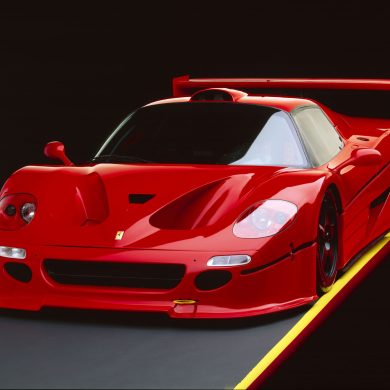
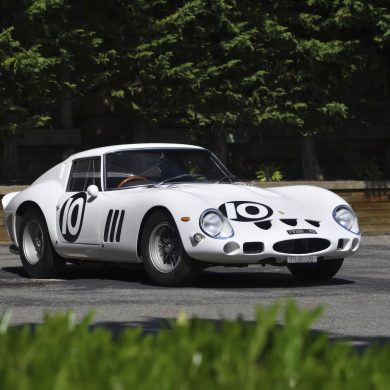
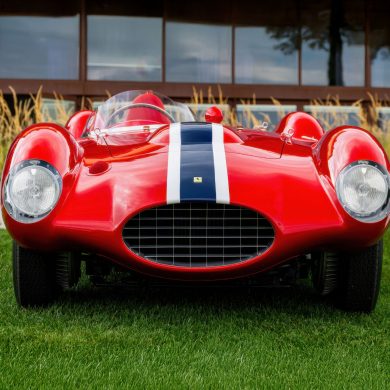
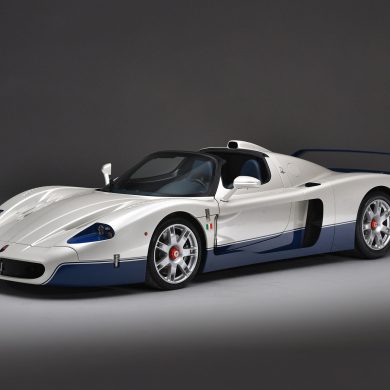
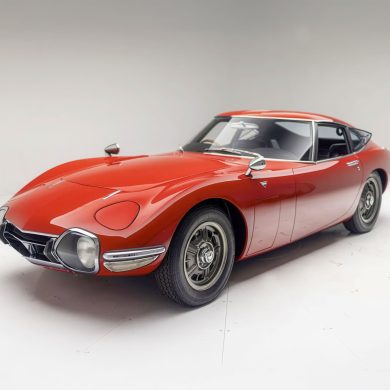
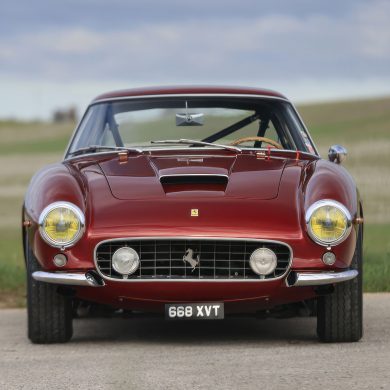


Wonderful, concise report. I always learn a lot from your observations. Keep up the great work.
Nice write up. The comment by RM about 6885 was an interesting play on words. They are actually stating that no front engined car has placed higher overall at Le Mans since then. A stat that I believe to be correct.
Matthew,
Speaking as a sometime catalog description writer, there was a lot of artful wording in RM’s catalog for the 275 GTB/C Speciale.
And it worked!
Rick
Thanks for a great report Rick. It was great to meet you this year at Pebble. No disagreements on my end this time!!
-Robert
I guarantee the new owner of the ex-Hella NIce 1927 Bugatti Type 35 will have a lot more fun after paying $3m than the new owner of the 1967 Ferrari 275GTB/C will, having spent over 8 times more…..
This is an example that shows that people who are paying high prices for some of the top Ferraris are not enthusiasts, just investors buying what they perceive to be “blue chip” investments.
Did someone mention the word “bubble?”
So did the seller of the Ferrari gain from selling at an auction? Most recently sales weer negotiated between the buyer and seller and often not even reported through the media. So did the seller net more this way, i wonder?
Mark,
This is a wide-ranging topic that deserves more than just a Comment, however I’ll try to give you a concise response, at least from my point of view.
The private treaty [a wonderfully evocative British expression that carries implications of class and refinement] sale process is often complicated and frequently fraught with multiple intermediaries both authorized and interlopers, all muddying the waters with their own representations and opinions and all seeking a piece of the transaction. It has the definite advantage of discretion but, as the sale of the Maranello Rosso Collection — bandied about among multiple brokers and agents for years — demonstrates, it can take a long time and many intermediaries before the right set of circumstances (prices, representations, prospective buyers, selling pressure) combine to close the deal.
On the other hand, selling at auction — at least for high profile, expensive, cars — is quick, concise and has one big advantage: it’s the place where lightning (e.g., the 275 GTB/C Competizione Speciale) can strike in a bidding contest.
Most (high profile, expensive) cars selling at auction bring at least ‘market’. Protected by reserves or auction company guarantees, they don’t go away below the seller’s expectations, and in a few rare cases they blow away all reasonable pre-sale evaluations. The instances are legion, from the 275 GTB/C at RM Monterey this year back to the famed GM Futurliner at B-J. Many fad cars got their initial boost up on to the price curve in exceptional auction transactions, from Boss 429 Mustangs and 190SLs to fabulous Ferraris.
The upside potential of the auctions — with superior presentation, marketing and lists of prospective buyers — is the why the headline cars gravitate to auction. That kind of explosive ‘wow’ result just isn’t going to happen in private treaty offerings where buyers have the chance to reflect, consult and consider without pressure, and, to be fair, sellers don’t have the chance to change their minds after an offer is made, even if it’s at the asking price.
That’s a long answer to a short question.
Short answer: Yes, the seller of the 275 GTB/C did better at auction. Way better.
Rick
Great report, Rick. In particular, I like reading your views with respect to prices paid and what appears to be happening to the collector car market. Please elaborate on the Mecum non-sales of high-end cars, particularly the Ferrari 375 MM — what really happened with it and why did the bidding seem to fall well short of the reserve?
Keep up the excellent work.
George,
I’ll leave that observation to the Mecum report [so you have an incentive to read it.]